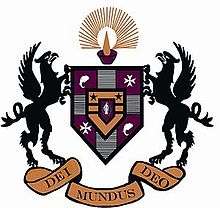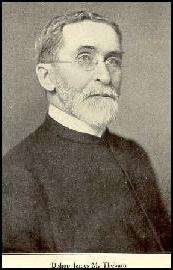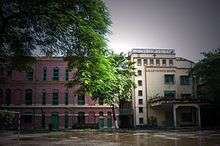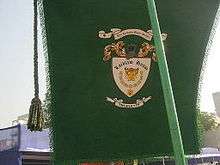Calcutta Boys' School
| The Calcutta Boys' School | |
|---|---|
 | |
| Address | |
|
72, S.N. Banerjee Road, Kolkata - 700014 Kolkata, West Bengal, India | |
| Information | |
| Type | Private |
| Motto | Dei Mundus Deo (Latin: The World of God for God) |
| Religious affiliation(s) | Methodist Episcopal Church |
| Established | 1877 |
| Principal | Mr. Raja McGee |
| Number of students | 2200 |
| Classes | Nursery (4+) to 12 (ISC) |
| Website |
www |
The Calcutta Boys' School was founded by the Rev. James Mills Thoburn (Methodist Missionary to India, and later Missionary Bishop of the Methodist Episcopal Church), and was opened in 1877. It was endowed by the late Robert Laidlaw and others interested in the education of the sons of the Anglo-Indian and domiciled European community.[1]
History

The origins of CBS are closely linked with the establishment of the Methodist Episcopal Church in India. In January 1873, the Reverend William Taylor founded the work of the Thoburn Methodist Episcopal Church in Calcutta (Kolkata).[1] He was succeeded by the Reverend James Mills Thoburn. The latter's ardent preaching soon rendered the Entally Baptist Chapel unable to cope with the increasing number of converts.[2] In February 1874, a new chapel was opened at 145 Dharamtolla Street, built at a cost of 16,000 rupees largely due to the generosity of George Bowen of Bombay who donated 10,000 rupees.[3] Soon even this chapel proved unable to accommodate the growing congregation, until a larger church was constructed on Dharamtolla Street, where it stands today. The New Thoburn Church was dedicated on 31 December 1875. In 1888 Rev. James Mills Thoburn was elected Missionary Bishop of India and Malaysia - the first ever Missionary Bishop in India.[2]
It was Bishop Thoburn who founded the Calcutta Boys' School. First located at Mott Lane, and then later housed in a room on Corporation Street (known as S. N. Banerjee Road today), the school struggled for survival without a building of its own. It acquired a permanent residence in 1893 thanks to the generosity of a man who could be regarded as the chief patron of the school: Sir Robert Laidlaw
The Girls School was erected in 1886, during the principal-ship of Miss Hendricks.[4]
During Clifford Hicks' time as Principal & Secretary, the newest of the three buildings that currently houses the CBS Chapel Hall was built. Named the Fritchley Building the construction was made possible by the retirement benefit and gratuity of Mr. Horace Christopher Fritchley which he donated to "his very dear CBS" together with donations collected by the students of the school.[1] The school library (now housed in the old dormitory) is named "The Clifford Hicks Memorial Library". The CBS Archives (established in 2008) are also housed in the Library.
Gilbert Samuel, who became Principal in 1997, furthered the cause of co-curricular activities, allowing the students of CBS to secure top positions at premier National and International contests regularly, including a second-place finish at the 2003 Biology Olympiad and the International Informatics Olympiad in 2004.[5] In 2005 CBS won the under-16 national cricket tournament, and in 2004 the national rounds of the Inter School Frank Antony Memorial Debate.[6]


Notable alumni
- M.J. Akbar, journalist, national spokesperson of the Bharatiya Janata Party
- Chandrajit Banerjee, Director General - Confederation of Indian Industry
- Sasthi Brata, writer
- Swapan Kumar Chakravorty, Professor of English, Jadavpur University, and former director of National Library of India
- Utpal Chatterjee, cricketer
- Tamoghna Ghosh, politician
- Altamas Kabir, former Chief Justice of India
- Amit Mitra, Finance Minister of West Bengal
- Rudrangshu Mukherjee, Editor, The Telegraph
- Binayak Sen, social worker and paediatrician
- Benjamin Walker, writer
References
- 1 2 3 Clifford Hicks by Alfred Martin, Pulse, Calcutta, February 1980.
- 1 2 "visions & victories in Hindustan" by Bishop B.T. Badley
- ↑ "The Opening Gate 1873-1923" Ed.by Louise Holloway Joyner
- ↑ Cultural and Educational Life in Calcutta
- ↑ The Telegraph, 2 June 2003; 5 June 2004
- ↑ The Telegraph unable to find exact date.